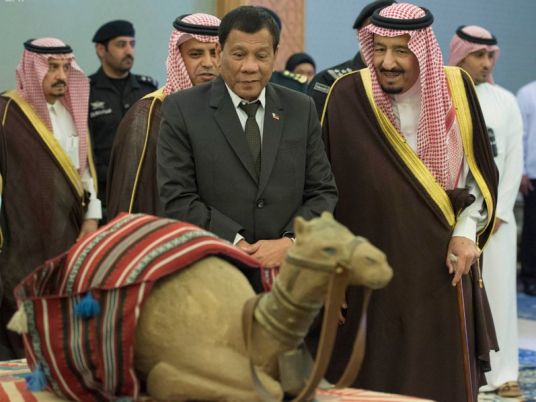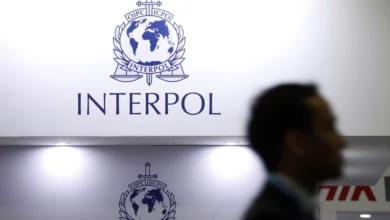
Philippine President Rodrigo Duterte met Tuesday with King Salman in Saudi Arabia, where hundreds of thousands of Filipinos work as nurses, domestic helpers, drivers, waiters and technicians. It was Duterte's first time meeting with the Saudi king.
Philippine media outlets report that the Middle East is the second largest source of remittances, with Filipinos sending back home some $7.5 billion in wages from the region last year. Local media report there are 760,000 Filipino workers living in Saudi Arabia, though that figure could be higher.
Before embarking on his weeklong tour of the Gulf, which includes stops in Qatar and Bahrain next, Duterte said the region is home to the largest group of Filipinos working overseas. More than 1 million Filipinos reside and work in Saudi Arabia, Qatar and Bahrain. Hundreds of thousands also work in the United Arab Emirates, Oman and Kuwait.
The official Saudi Press Agency reported that Salman hosted Duterte for lunch in the capital, Riyadh, and that the two sides signed a number of memorandums, including some dealing with labor. The report did not disclose further details about the memorandums signed.
A slide in oil prices has impacted Saudi government spending and the revenue of Saudi companies relying on state-backed infrastructure projects. This has left tens of thousands of Filipinos and South Asian laborers without pay and, in many cases, without airfare or exit permits to return home.
In addition to discussing labor issues, Duterte said his visit to the kingdom would also address ways to broaden cooperation in trade, investments, security, energy and anti-narcotics.
Both Saudi Arabia and the Philippines have strict laws against drug dealing and drug smuggling. In Saudi Arabia, dozens of convicted drug smugglers are executed each year. In the Philippines, Human Rights Watch says 7,000 have died in Duterte's war on drugs, many of them in extrajudicial killings. Duterte has said he does not condone unlawful killings, although he has threatened criminals with death in several speeches.
In Qatar and Bahrain, expatriate workers outnumber the local population. In Saudi Arabia, a third of the population — around 9 million people — are foreigners, many of whom take on low-wage jobs that Saudi citizens shun.
Saudi analyst Khaled Almaeena said the kingdom's labor laws are good on paper, but there are concerns around their implementation. Almaeena has advocated for protecting the rights of foreign workers in Saudi Arabia, and during his time as editor of the Saudi daily Arab News he started a weekly for Filipino expats called "Pinoy Xtra."
"Without the contribution of the Filipino nurses the hospitals here would fall flat," he said.




